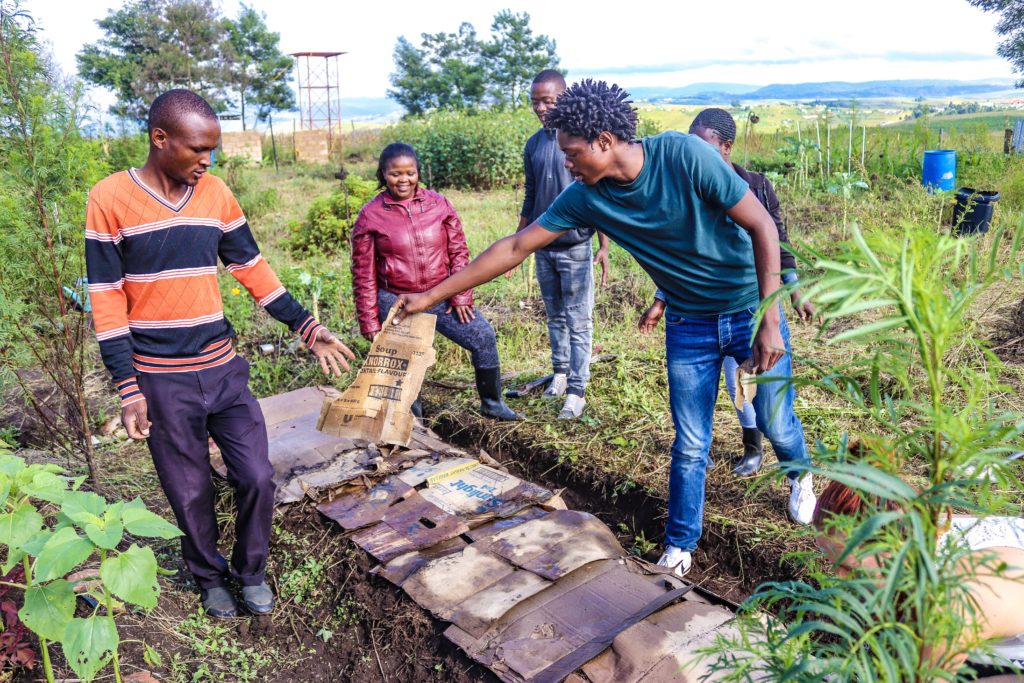Eight hours from Makhanda (Grahamstown) deep in the rural former Transkei thrives a small garden project. Perched atop the lush and wild hillsides of Ingquza Hill near Flagstaff, the Wana Johnson Development Project has made a space for organic produce in a community of GMOs. Grocott’s Mail took a pit-stop at the garden, and left in awe of the inspiration, passion and promise that the project holds.
The founding ‘green thumb’ of the project is that of former Johannesburg banker, Khaya Mposula. Having family history at Ingquza Hill, Mposula said she always wanted to come back to the area to farm. In 2012 she finally started building. The project’s four hectares are slowly growing; currently Mposula stays in a small eco-friendly home, kitted out with a private borehole and solar power, and spends her time working with community youth in the garden during the day, and beading in the stillness of the evening.
With the help of Yes4Youth, Wildlands Trust and Nedbank; youth are able to work in Mposula’s garden, learning vital skills about farming and conservation as well as developing character.
“The project has 3 main focus points”, said Mposula. “Organic farming, recycling and renewable energy, and tourism. This leaves a few options open to the youth that they can choose from. The intention is to teach them or share the benefits of working the soil while looking after the environment but at the same time reminding ourselves what our grand parents practiced in terms of tradition and culture.”
Current recruits included Vuyani Xulu, Fezeka Mxalelwa, Nwabisa Zilwa and Awethu Njiva; three from the local Vlei Village and one from Kwa-Zulu Natal. They emphasised their love of gardening, and that they never knew the dangers of GMO food. Part of Mposula’s vision is to help teach the local community about the benefits of organically grown food, versus GMO. Common chronic illnesses like diabetes, hypertension and high cholesterol can be a direct result of an unhealthy diet. With South Africa’s healthcare system in dire need of repairs, a simple shift away from GMO foods can make a world of difference.
Currently the garden has kale, peppadews, chillis, and a selection of herbs and flowers. The rossella plant is one of Mposula and the volunteers’ favourites. Once the rossella has begin to flower, the small hibiscus like buds are harvested for use in teas. “In the next few seasons we will start testing crops like sorghum, moringa, rosella, amaranth and fruit trees.”, said Mposula.
The area has suffered under the Eastern Cape’s drought just as much as Makhanda, but in December 2018 a gracious donation of hippo rollers to the community by a Canadian organisation helped lighten the burden. A hippo roller is a plastic water barrel that has been turned on its side and fitted with a metal handle, almost like a wheelbarrow. Once the hippo is filled with water, the handle can be used to push the roller wherever the water needs to be distributed.
Though the project is small, it is clear that the community as well as Mposula are setting deep roots to continue to grow their relationship with eachother and their natural environment. All good things take time to grow, and this little garden is off to an amazing start.
Grocott’s Mail kindly thanks Mposula for her hospitality and samples of the delicious garden produce.
For more information on how to visit the project please contact ed7@ed.grocotts.co.za


